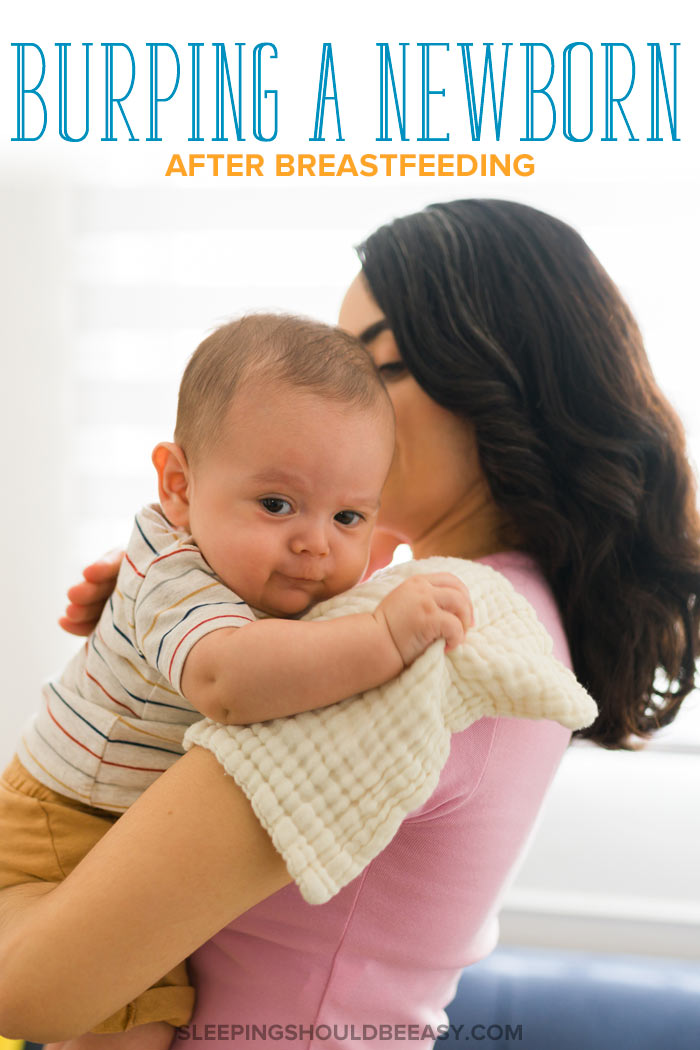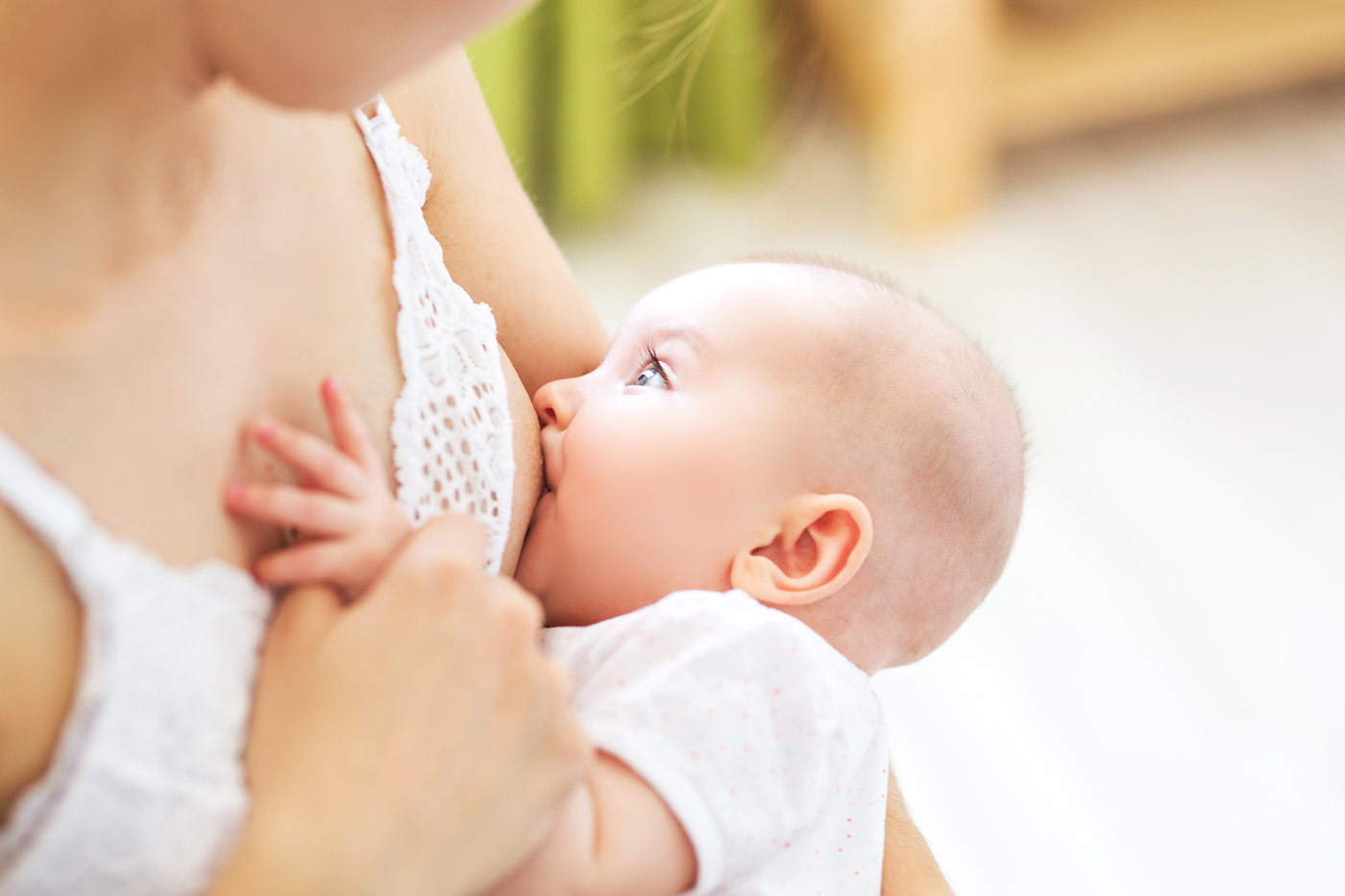Is Burping a Newborn After Breastfeeding Necessary?
Is burping a newborn after breastfeeding necessary? Learn whether you still need to burp your breastfed baby—the answer might surprise you.
 I actually think my mom’s favorite thing to do with babies is to burp them.
I actually think my mom’s favorite thing to do with babies is to burp them.
Fussy baby? “Oh, he needs to burp,” she’ll decide as she grabs a bib or places a towel over her shoulder. Spit up coming out of his mouth? “Let me burp him for you.” She coos at them, singing “burp, burp, burp!” as she pats their backs with her free hand.
I even think she would’ve kept burping them all through toddlerhood if given the chance.
Kidding aside, burping my babies became a habit, right from the start. But early on, I started to wonder whether burping a breastfed baby was necessary, especially at night. Do I keep patting and burping, or do I let him fall back asleep? Is it bad for him if he didn’t burp after a feeding?
After all, you hear that bottle-fed babies swallow more air bubbles compared to breastfed babies, who nurse directly from the breast.
So, I’d find myself holding the baby for what seemed like forever, delirious with sleep deprivation.
Table of Contents
Burping a newborn after breastfeeding: Necessary or not?
Perhaps you can relate. Maybe you’ve tried several times to burp your newborn after breastfeeding to no avail. She either fell back asleep or didn’t make a single peep. Or you’re a first-time mom and genuinely curious (or have no idea) if you even need to burp your baby after each breastfeeding session.
After three boys and talking to countless moms, I’ve learned that it is important to give your newborn a chance to burp, even if you breastfeed. Here’s why:
- Your baby might be a fast eater and still consume too much air during nursing
- Your letdown might be fast or strong, contributing to gassiness
- She could take in air as she’s trying to latch (or if she pulls back to a shallow latch)
- Gas can still make its way into her body, like from regular digestion
In other words, just because a baby isn’t drinking from a bottle, that doesn’t mean she doesn’t need to burp.
Still, don’t assume you always have to burp her—and sacrifice sleep in the process—after each feeding session. Take a look at a few best practices for burping a newborn after breastfeeding to help you find that balance:
1. Burp your baby between switching sides
Does your baby fuss after eating, struggle to fall back asleep, or have a lot of spit up after breastfeeding?
Sometimes a baby consumes so much breast milk—even if it’s milk he needs for a full belly—that he feels uncomfortable right after. One of the best ways to pace your baby is to have a burping break between switching sides as well as after nursing.
Let’s say you nurse him on the right breast first. After he has emptied that side, spend a minute or two burping him before offering the left side. This gives him a mid-meal break and an opportunity to pass gas before having his full meal.
Free resource: Do you struggle with getting him to sleep? His awake time might be affecting how well he sleeps. Join my newsletter and get your copy of One Mistake You’re Making with Your Baby’s Awake Time—at no cost to you—and discover one mistake you may be making with his awake time. Grab it below:
2. Offer your baby a chance to burp each time
My general rule was that even if my baby wouldn’t burp after breastfeeding, I would at least give him a chance to try.
After every feeding session, give your baby a chance to burp in case he needs to. This doesn’t mean you keep him upright until you finally hear that burp. After all, he might’ve fallen asleep in the process, especially in the middle of the night.
But by burping him consistently after each feeding, you’re at least giving him a chance to expel any gas he might have. Plus, you’re keeping him upright or at an incline, which helps avoid spit up and digestion problems.
If he fell asleep, holding him over your shoulder with a burp cloth for a few minutes and patting his back is good practice before setting him down.
3. Keep your baby upright
A breastfeeding baby may not need as much burping since he takes in less air than if he were bottle-fed. No matter how long you pat him, nothing comes out.
If that’s the case, then keep him upright or at an angle for a few minutes after breastfeeding and rub his back with the palm of your hand.
Don’t lay him down flat—whether on his back or tummy—as this can cause spit up and discomfort. (It’s also why you don’t bottle-feed a baby while he’s lying flat on his back.)
Instead, hold him over your shoulder, sit him on your lap facing away from you, or prop him on a nursing pillow—anything so long as his head is higher than his tummy. And you generally don’t want to do tummy time, as that can press down on his stomach.
When to stop burping a breastfed baby?
At what age do you stop burping a baby? I learned that you can generally stop burping a baby once she has learned to sit on her own. This can happen anywhere between four to nine months of age.
You’ll also likely follow her lead, especially as she becomes more mobile and “has no time” for sitting still for patting and burping. According to the experts on Dr. Brown’s:
“When she can sit up for longer periods on her own, she should begin developing self-burping skills.”
Conclusion
I was one of those parents whose babies didn’t burp after every feeding. But rather than waiting for that burp that would never come, I held him over my shoulder for at least five minutes before laying him down.
During the day, I’d keep him in an upright position or at an angle, rather than flat on his back or tummy, even if a burp never surfaced. And burping between switching sides—or even holding him upright over my shoulder—also helped prevent spit up.
You see, even if burping a newborn after breastfeeding doesn’t always result in a perfect burp, helping your baby even for a few minutes can still help. Unless you’re like my mom, who could spend just about all day patting the baby, singing “Burp, burp, burp!” all the while.
Get more tips:
- How to Burp a Baby That Is Hard to Burp
- Newborn Life: Expectation vs Reality
- Tips for New Dads in the Newborn Stage
Don’t forget: Join my newsletter and grab your copy of One Mistake You’re Making with Your Baby’s Awake Time—at no cost to you:



